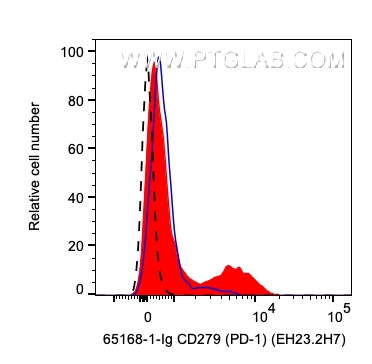验证数据展示
经过测试的应用
| Positive FC detected in | PHA treated human PBMCs |
推荐稀释比
| 应用 | 推荐稀释比 |
|---|---|
| Flow Cytometry (FC) | FC : 0.2 ug per 10^6 cells in 100 μl suspension |
| This reagent has been tested for flow cytometric analysis. It is recommended that this reagent should be titrated in each testing system to obtain optimal results. | |
| Sample-dependent, Check data in validation data gallery. | |
产品信息
65168-1-Ig targets PD-1/CD279 in FC applications and shows reactivity with Non-human primates, Human samples.
| 经测试应用 | FC Application Description |
| 经测试反应性 | Non-human primates, Human |
| 免疫原 | Recombinant human CD279 protein 种属同源性预测 |
| 宿主/亚型 | Mouse / IgG1, kappa |
| 抗体类别 | Monoclonal |
| 产品类型 | Antibody |
| 全称 | programmed cell death 1 |
| 别名 | CD279, hPD 1, hPD l, PD1, PDCD1, programmed cell death 1, Protein PD 1, SLEB2 |
| 计算分子量 | 288 aa, 32 kDa |
| GenBank蛋白编号 | BC074740 |
| 基因名称 | PD-1 |
| Gene ID (NCBI) | 5133 |
| RRID | AB_2918445 |
| 偶联类型 | Unconjugated |
| 形式 | Liquid |
| 纯化方式 | Purified by protein-A affinity chromatography |
| UNIPROT ID | Q15116 |
| 储存缓冲液 | PBS with 0.09% sodium azide, pH 7.3. |
| 储存条件 | Store at 2-8°C. Stable for one year after shipment. |
背景介绍
Programmed cell death 1 (PD-1, also known as CD279) is an immunoinhibitory receptor that belongs to the CD28/CTLA-4 subfamily of the Ig superfamily. It is a 288 amino acid (aa) type I transmembrane protein composed of one Ig superfamily domain, a stalk, a transmembrane domain, and an intracellular domain containing an immunoreceptor tyrosine-based inhibitory motif (ITIM) as well as an immunoreceptor tyrosine-based switch motif (ITSM) (PMID: 18173375). PD-1 is expressed during thymic development and is induced in a variety of hematopoietic cells in the periphery by antigen receptor signaling and cytokines (PMID: 20636820). Engagement of PD-1 by its ligands PD-L1 or PD-L2 transduces a signal that inhibits T-cell proliferation, cytokine production, and cytolytic function (PMID: 19426218). It is critical for the regulation of T cell function during immunity and tolerance. Blockade of PD-1 can overcome immune resistance and also has been shown to have antitumor activity (PMID: 22658127; 23169436).
实验方案
| Product Specific Protocols | |
|---|---|
| FC protocol for PD-1/CD279 antibody 65168-1-Ig | Download protocol |
| Standard Protocols | |
|---|---|
| Click here to view our Standard Protocols |
